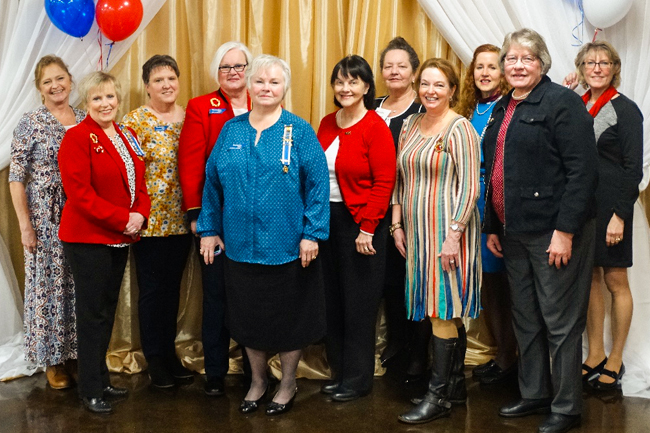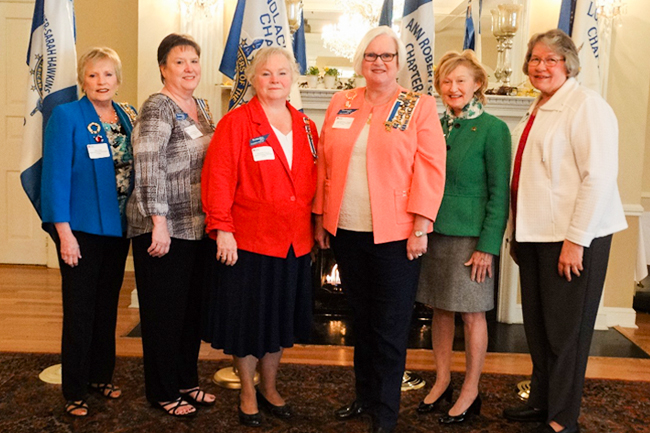DAR Hosts Washington Birthday and Appalachian District Luncheon
The first U.S. First Lady Martha Washington and the Woman Suffrage Movement in Tennessee were the points of focus at two luncheons recently attended by members of the Martha Dandridge Washington Chapter (MDW), Daughters of the American Revolution (NSDAR).

Torrential rain and flooding of city streets were unable to deter attendees of the George Washington’s Birthday Luncheon hosted by the Knox County Council of Regents on February 23 at Rothchild’s in Knoxville. The attendees heard Charlotte Reynolds, Tennessee State Regent, share some insights into the first presidency from Martha Washington’s point of view as the ladies celebrated the 287th birthday of the President and the 260th anniversary of the marriage of George and Martha.
Those representing the MDW Chapter were Regent Jane Chambers, Ellie Betts, Jane Busdeker, Elizabeth Finchum, Susie Jarnagin, Karen McFarland, Glenda Roach, Deborah Sheppard, and Prospective Member Gail Wilczynski.
After the young widow Martha married George, the couple wanted nothing more than to settle down at Mount Vernon and lead a quiet life. However, the Revolutionary War and George’s selection as commander of the patriot forces determined that a quiet life was not to be. While George was fighting, Martha supported him from home. In addition, each winter of the war, Martha went to wherever he was quartered and oversaw social activities to keep up the spirits of not only her husband but also the other military wives and officers.
When General Washington was elected President, Martha missed the pomp and circumstance of the inauguration because she was at home preparing to move to the capital. A week later, Martha was still involved in packing up the household while George danced the evening away with other ladies at the inaugural ball. He was known for loving to dance. When Martha finally arrived in Washington, she was the center of the social life in the capital: teas on Tuesdays, dinners on Thursdays, and dances on Fridays.
Once George was out of office and returned to Mt. Vernon, Martha still had to share her husband as national leaders often dropped by to visit and discuss political issues. Martha understood her husband’s place in the country and supported him in every way, and he loved her dearly. As George was “first in the heart of his countrymen,” Martha was first in the heart of George.
Three weeks later, on a bright sunny morning, six MDW Daughters traveled to Johnson City to hear Wanda Sobieski, J.D., and Coordinator of the Woman Suffrage Coalition, discuss the passage of the 19th Amendment, which gave women the right to vote. The 35th Annual Spring Luncheon of the Appalachian District of the NSDAR was hosted by the NE TN Council of Regents at the Johnson City Country Club on March 16.
Attending that gathering from the MDW Chapter were Regent Jane Chambers, Ellie Betts, Jane Busdeker, Elizabeth Finchum, Karen McFarland, and Pat Whaley.

In her address titled “Showdown at Knoxville,” Ms. Sobieski shared the story of the struggle to give women the vote that began in 1848 in Seneca Falls, NY, and came to full fruition in August 1920 when twenty-four-year-old Tennessee legislator Harry Burn followed advice from his mother in a letter urging him to be a “good boy” and vote for suffrage.
With that vote, Burn ended the tie in the Tennessee legislature, and the state became the last one needed to ratify the amendment. Between the Seneca Falls Convention on The Rights of Women and the passage of the constitutional amendment were numerous public demonstrations, some resulting in incarcerations of women, beatings, forced feedings, and confrontations with President Woodrow Wilson. The movement lost some momentum during the Civil War and the First World War but roared back after each until it reached its goal.











